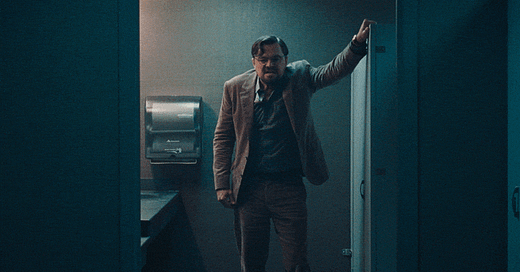Moneyball is a newsletter from Koble exploring the limitations of human decision-making and their implications for startup investing.
We’ve spent three years developing our groundbreaking algorithms, which discover early-stage startups that outperform the market and predict their probability of success.
This week
🧠 Mental Model #32 – Pain – The Truth Hurts
📖 Investor reading – Some of Silicon Valley’s Most Prominent Investors Are Turning Against Biden – Unpacking the European VC Playbook – Studio Tour: A VC firm’s Disco-inspired Office in San Francisco
💬 Some tweets – Venture Capital is dead – Take the job at the startup – People who work in VC
The Truth Hurts
Pain is central to the human experience; how we experience it, how we avoid it, and sometimes, how we can leverage it.
Not all pain is productive, but a lot is. Periods of acute discomfort are usually followed by breakthroughs, be they physical, mental, or spiritual. What doesn’t kill us makes us stronger, stranger, and wiser. And it might make us wealthier, too.
In our personal lives, we intuitively know that pain can be good. We do things like enter marathons, endure childbirth, voluntarily jump into ice-baths, and indulge in other extreme activities that arbitrage short-term pain for long-term gain. Weightlifter Jerzy Gregorek neatly sums up this phenomenon with his deceptively powerful mantra:
“Easy choices, hard life. Hard choices, easy life.”
But when it comes to the world of work, we tend to avoid pain at all costs.
Hope this finds you well
The culture of corporate life – the user experience of traditional employment – leaves no room for pain.
Discomfort is something to be reported, minimised, perhaps even eliminated. Emails are passive aggressive (no drama), chairs are ergonomic (no bad backs), flowers are plastic (no allergies), and HR is always on hand for a supportive chat (no thanks).
The result of this zero-tolerance approach to discomfort is lower growth. Trapped in their comfort zones, large companies fail to adapt and evolve. Employees become comfortable, failing to push into new experiences, relationships, and ways of working.
There are, of course, some outliers. Jensen Huang, President of NVIDIA, has said:
“Resilience matters in success. I don't know how to teach it to you, except I hope suffering happens to you...I use the phrase “pain and suffering” inside our company with great glee.”
These are not the words of a sadistic dictator presiding over a toxic company, but the counter-cultural wisdom of a man who has built the world leader in AI computing.
What doesn’t kill you
Most startup founders know this. Startups are not comfortable things to launch and operate. They are, more often than not, painful and rewarding endeavors, even if few deliver the outsized financial rewards they promise.
But investors are different. Fear and greed reflect our obsession with pain and pleasure; we will do anything to avoid the pain of losing money.
And when it comes to assessing our behavior and how it drives investment performance, we fail to recognise the impact of pain (or more accurately, our counter-productive responses to it).
Over and over again
Rohini Terry and her colleagues at the University of Stirling have explored the phenomenology of pain – whether we remember pain itself, or merely are aware as a semantic fact that the pain took place.
They found that we tend to forget the intensity of the pain and instead remember painful episodes in factual terms – meaning we fail to properly grasp how pain influenced our decision-making.
That is particularly problematic for investors. We fail to recognise the role of pain avoidance in asset selection (and de-selection). And we risk making the same mistakes over and over again. Many VCs are stuck in a doom loop of chasing losses, forgetting that Pre-Seed and Seed investing is about finding winners – that's where the gold comes from. Investors should not be throwing good money after bad to soften losses and minimise pain.
Implications for investors
Bruce Lee knew a thing or two about pain. He said:
“The pain will leave once it has finished teaching you.”
We cannot grow if we do not allow pain to modulate our thinking and behavior. It would be perverse to suggest that investors should not seek pain, but we should not seek to eliminate it either.
Rather we should seek to accept pain as a necessary part of our growth. Something that visits us from time to time like a long-lost (and extremely difficult) relative, but does not need to live with us full-time.
It’s in our nature to minimise suffering, but in doing so, we reduce progress. Pain can make us better investors, and better people. If we would just let it.
Work with Koble
At Koble, we’ve spent three years developing our groundbreaking algorithms, which discover early-stage startups that outperform the market and predict their probability of success.
We’re working with forward-thinking angels, VCs, family offices, and hedge funds to re-engineer startup investing with AI. If that resonates, get in touch.
Investor reading
🏛 Some of Silicon Valley’s Most Prominent Investors Are Turning Against Biden – Marc Andreessen, Chamath Palihapitiya and several other tech VCs are increasingly criticizing President Biden and making their disaffection known in an election year.
🇪🇺 Unpacking the European VC Playbook – A conversation between Frederic Court (Felix Capital) and Luciana Lixandru (Sequoia) about the recent trend of US VCs going to Europe and how the two markets can work together.
🕺 Studio Tour: A VC Firm’s Disco-inspired Office in San Francisco – Designed by Studio Plow, NFX’s office is a vibrant space for connection, celebration and creativity.
Some tweets
Parting shot
“Behind every beautiful thing, there's some kind of pain.”
― Bob Dylan
Regards from your [painful] startup investing AI,
About Koble
Koble is re-engineering startup investing with AI, applying quantitative strategies that have disrupted public markets to early-stage startup investing.







